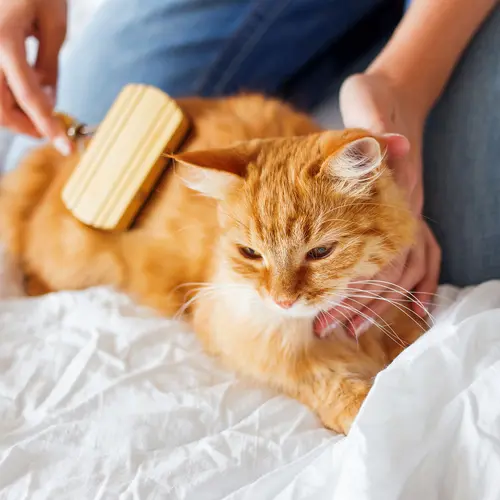What Is Spinosad?
Spinosad (brand name: Comfortis) is classified as a macrocyclic lactone flea adulticide. It is approved by the FDA for prevention and treatment of fleas in dogs, puppies, cats, and kittens. Spinosad is not approved for tick control.
Spinosad is generally well tolerated in animals. Spinosad starts to kill fleas within 30 minutes. Fleas are completely dead within 4 to 8 hours.
Spinosad is available by prescription from your veterinarian or from a veterinary pharmacy. It is available as a beef flavored chewable tablet in various sizes. Spinosad is available alone or in combination medicines.
How Is Spinosad Used in Pets?
Spinosad is a beef flavored chewable tablet given by mouth. Dogs and puppies should be at least 14 weeks old and weigh at least 5 pounds (2.2 kilograms). Cats and kittens must be at least 14 weeks old and weigh at least 4.1 pounds (1.8 kilograms).
Give spinosad every 30 days (monthly) without stopping for best results.
Spinosad must be given with a small amount of food or immediately after the pet eats. Make sure the entire chewable tablet is eaten. If the animal vomits within 1 hour after getting the medicine, another full dose needs to be given.
Use the correct animal species dosing chart to avoid overdose.
Always follow your veterinarian’s directions for giving medicines to animals. Remember to tell your veterinarian about any medicines, vitamins, supplements, or herbal therapies that you are giving your pet. Talk to your veterinarian before stopping any pet medicines.
What Are the Benefits of Spinosad for Dogs and Cats?
- Spinosad is well-tolerated by animals, including puppies and kittens.
- Spinosad is FDA-approved for use in dogs, puppies, cats, and kittens.
- Spinosad starts to kill fleas in 30 minutes in dogs and cats.
- You only have to give one chewable tablet every 30 days.
What Follow-up Is Required With Spinosad?
You and your veterinarian should monitor your pet for improvement of their condition, as well as for side effects of the medicine. Signs of improvement include fewer live adult fleas and ticks, less itching, and less scratching.
Does Spinosad Have Warnings or Side Effects in Dogs?
Do not use spinosad in animals that are allergic to it. Do not use spinosad in dogs that weigh less than 5 pounds or are less than 14 weeks old. Do not use spinosad in cats that weigh less than 4.1 pounds or are less than 14 weeks old. Do not use spinosad in animals that are receiving high doses of a medicine called ivermectin. Use with caution in animals that have a history of seizures (epilepsy). Use with caution in breeding, pregnant, or nursing animals. Use with caution in animals with pork or soy allergies.
Spinosad is usually well-tolerated in animals. Side effects in dogs or cats include:
- Vomiting
- Diarrhea or loose stool
- Weight loss
- Lack of energy
- Scratching or itching
- Excessive drooling
While there is a low risk of serious side effects, they can happen with spinosad. Serious side effects include:
- Seizures or convulsions
- Weakness
- Incoordination (difficulty walking)
If you suspect that your pet is having a serious side effect or may have been overdosed, call your veterinary clinic immediately. If it is outside of regular office hours, you may contact a local emergency veterinary hospital or an animal poison control center. Note that fees may apply for emergency consultation.
You can reach the ASPCA Animal Poison Control Center at 888-426-4435 or the Pet Poison Helpline at 855-764-7661.
Does Spinosad Interact With Other Medicines?
Using multiple medicines can sometimes change how your pet’s medicines work or increase your pet’s risk for serious side effects. Always tell your veterinarian about any prescription or over-the-counter (OTC) medicines, vitamins/minerals, herbal products, and other supplements that your pet is using.
Some medicines that may interact with spinosad are cyclosporine, ivermectin (especially extra-high doses), ketoconazole, and loperamide.
This may not be a complete list of medicines that can interact with acepromazine. Always check with your veterinarian.
Are There Safety Concerns for Pet Owners?
- Keep spinosad out of reach of children.
- Wash your hands after giving spinosad to your pet.
- Do not handle spinosad if you are allergic to it.
What If My Pet Takes Too Much Medicine or Has an Overdose?
Spinosad is very well tolerated by animals and the risk of an overdose is low. If you are concerned your pet is having an adverse reaction or if you suspect your pet has taken more spinosad than prescribed, call your veterinarian or veterinary emergency clinic immediately.
What If My Pet Misses a Dose?
If your pet misses a dose, give the dose when you remember and then continue with the rest of the medicine at the correct time. Do not double the dose of the medicine.
How Do I Store Spinosad?
Store spinosad in the original foil packet at room temperature. Protect it from light.

